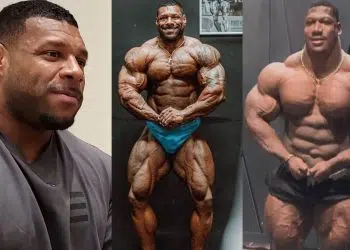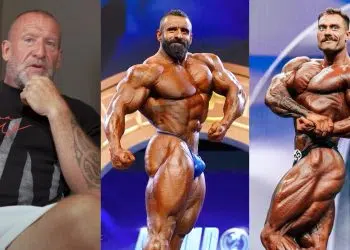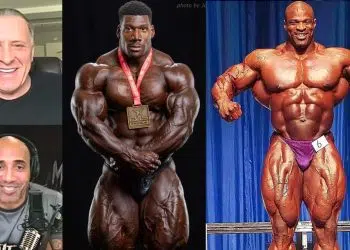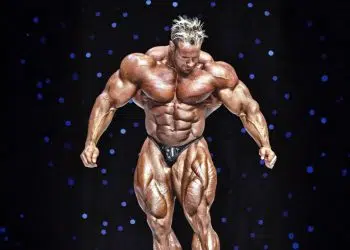Whether a person is a competitive bodybuilder or a frequent gym-goer, creatine has likely crossed their path. In a recent offering on YouTube, Dr. Rhonda Patrick broke down how creatine works for muscle performance and growth, underscoring some of the misconceptions surrounding the supplement.
Creatine is one of the most popular and widely studied supplements on the market. Literature suggests that the supplement can help build muscle mass while enhancing exercise performance, cognitive function, endurance, and recovery, particularly in those who regularly engage in physical activity.
While that all seems wonderful, the supplement has also been linked to undesirable side effects, which can include bloating, weight gain, constipation, GI upset, and baldness. That being said, Dr. Rhonda Patrick, a biomedical scientist, has used her knowledge of nutrition, metabolism, and aging to shed some light on whether creatine should be a part of your supplement stack.
Dr. Rhonda Patrick Unveils Science Behind Creatine Use for ‘Muscle Performance and Growth’
Dr. Patrick explained that creatine is transformed inside our muscles into phosphocreatine through an enzyme called creatine kinase. Phosphocreatine is one of the main drivers of ATP production, which serves as the primary source of energy in most of our cells during high-intensity/short-duration exercise.
Level Up Your Fitness: Join our 💪 strong community in Fitness Volt Newsletter. Get daily inspiration, expert-backed workouts, nutrition tips, the latest in strength sports, and the support you need to reach your goals. Subscribe for free!
“How does creatine work? It does play a really important role in how our muscles produce energy. Inside of our muscles, creatine is transformed into phosphocreatine through the action of an enzyme called creatine kinase, which by the way requires magnesium to function.
Phosphocreatine is a key player in the production of ATP; this is the primary source of energy in most all of our cells particularly during high-intensity short-duration exercise or long-duration endurance exercise as well.”
Boosting our muscles’ capacity to create ATP, creatine supercharges the energy production process which results in better performance, power, and growth.
“Supplementing with creatine can supercharge this whole energy production process. It boosts our muscles’ capacity to produce ATP. It enhances energy available, particularly under intense anaerobic activities.
This increase in available energy can lead to improved muscle power. It can help performance as well. These enhancements can lead to even gains in muscle performance and growth.”
In addition, Dr. Patrick revealed that creatine can speed up muscle recovery after workouts, making it easier to bounce back after strenuous exercise.
“Creatine has been shown to help speed up with muscle recovery post-workout. So, potentially making it easier to bounce back after really intense training sessions. The International Society for Sports and Nutrition regards creatine monohydrate as the most effective ergogenic so this is a performance-enhancing nutritional supplement on the market for athletes and fitness enthusiasts looking to increase their strength, power, and muscle mass.”
Dr. Patrick explained that continued creatine supplementation of three to five grams per day helped maintain elevated levels following a loading phase.
“A lot of these studies were done with a loading phase, so they are about five grams or approximately 0.3 grams per kilogram of body weight. If creatine is taken four or five times a day, that’s a lot of creatine. That was able to increase creatine stores in muscle tissue by 20-40% with continued supplementation 3-5 grams per day required to maintain those elevated levels.”
“Combining resistance training with creatine supplementation does improve strength. It improves upper and lower body strength. It increases fat-free mass and it enhanced muscular endurance and bone mineral density.”
Even though weight gain has been considered a side effect of creatine, Dr. Patrick underlines that this is probably due to water, not fat mass accumulation.
“The only consistent reported side effect of creatine supplementation has been I would say weight gain but not fat mass. So, this probably is water gain but that’s really the main I would say consistent main adverse effect with creatine supplementation.”
Moreover, Dr. Patrick adds that creatine supplementation has no ‘serious adverse health risks’ as supported by a number of short-term and long-term studies.
“There’s a lot of short-term and long-term studies in healthy and also people with diseases, ranging from infants all the way to the elderly, and the doses from creatine ranging from 0.3-0.8 grams per kilogram of body weight per day for up to five years and they have shown that creatine supplementation really has no serious adverse health risks.”
Dr. Patrick believes it’s a misconception that creatine causes hair loss.
“Does creatine cause hair loss and baldness? I think that’s another I would say misconception that sort of makes its rounds in the blogosphere and in peoples’ minds. So, the link between creatine supplementation and hair loss originates from this one study. It was in college-aged rugby players. In this study, the participants took 25 grams of creatine a day for a week.
Just one week. Then, they did, that was their loading phase, then they did five grams a day for two more weeks. After the end of the three-week trial, there was a notable increase in their serum DHT levels, their dihydrotestosterone levels. It was a 56% rise after their initial week and a 40% increase from baseline even after the maintenance period,” says Rhonda Patrick.
Although increases in DHT were present in those who took 25 grams of creatine per day for a week, she doesn’t believe this is an indication that the supplement causes hair loss.
“Increases in DHT has been associated with hair loss in some cases. So, the concerns about creatine contributing to baldness have come from this study and DHT levels, not any indication of actually those participants losing hair or anything like that.”
Fellow health expert and bodybuilding legend Arnold Schwarzenegger has also taken a close look at creatine, revealing whether or not it causes hair loss in those who use the supplement:
“The confusion started with one study in 2009, which found that creatine increases DHT levels, a hormone connected to hair loss. But the story goes deeper.”
“The changes in DHT were not significant and within a normal fluctuation, meaning the shift wasn’t even necessarily enough to trigger hair loss. Not to mention, based on dozens of other studies, creatine does not affect androgen levels, which can affect hair follicles and lead to loss.”
As for creatine and its effects on bloating, Schwarzenegger once again, came to the supplement’s defense:
“Creatine pulls more water into your muscle cells, meaning you have hydrated, healthier muscles — not bloating. And this relates to another myth about creatine causing dehydration.
When researchers looked at hydration, they found that people who used creatine had less cramping, heat illness, dehydration, muscle tightness, and muscle strains than those who took a placebo sports drink.”
Boasting over 519,000 subscribers on YouTube, Dr. Rhonda Patrick is committed to offering reliable and actionable advice for anyone pursuing a fitness journey. While creatine use can result in unwanted side effects, for the majority of users, Patrick believes the supplement will provide a host of benefits ranging from improved exercise performance to enhanced muscle growth.
RELATED: Jay Cutler Discusses Benefits of Creatine: “You Always Want to Be at Your Best Performance”












